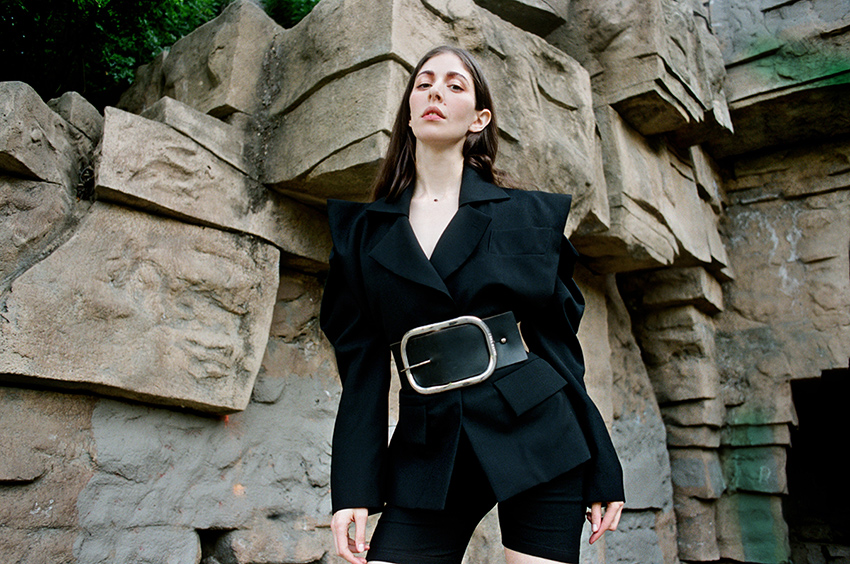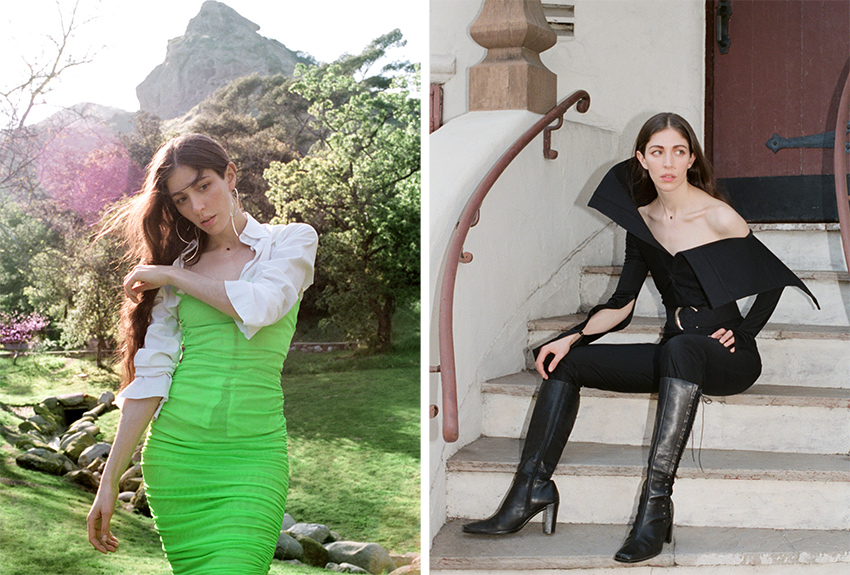The Futuristic Folklore of Caroline Polachek
The avant-garde, ever-elusive siren who’s building the surreal future of pop is putting down roots.

I first heard Caroline Polachek’s one-of-a-kind voice at an underground rave, where a beautiful man in a dilapidated wedding dress blasted a chopped-and-screwed remix of So Hot You’re Hurting My Feelings through the sweat-flecked, ketamine-infused nighttime air. There’s a part in that song, before the last chorus, where she takes a deep, shuddering breath before launching into the song’s explosive finale. It’s a visceral, parasympathetic moment — you can picture her seizing up, gasping for air, before releasing into electric, adrenal bliss. It’s a perfect moment in a perfect pop song.
This rush of epinephrine is at the core of Polachek’s artistry. She sings with a primal, dizzying force that can only be described as supernatural — she often moves between notes with an electronic deftness that’s misleadingly synthetic, to the point where you have to watch her sing live to believe it’s not auto-tuned.
“As a vocalist, there’s something very, very physical about what you’re doing. It’s very related to drawing,” she explains to me on the phone from her new Los Angeles home. Polachek has said in the past that she counted the twisting, folkloric engravings of 17th-century artist Jacques Hurtu among her inspirations, but it’s in a way that’s more physical than aesthetic. “I look at those engravings and it looks like music to me. It looks like the way I want my vocal lines to feel.”
At its highest register, her voice is diaphanous and otherworldly, somewhere between the call of a siren and the religious arias of an 11th-century abbess. When combined with Polachek’s futuristic synth stylings, the result is like something from a science-fiction novel. Polachek is lithe and willowy, with a surreal, selkie beauty that matches her ethereal voice. Her visual work deals heavily in the fantastical, where her elven features fit right in — it’s almost hard to imagine what she would look like in everyday clothes (or, rather, it’s easy to imagine that she simply wears leather, buckles and 18th-century corsetry to the grocery store). She frequently co-directs her music videos, which take inspiration from Greek mythology, obscure surrealism and historical fantasy.

After 11 years spent at the helm of the Brooklyn synth-pop band Chairlift and a series of projects released under the names Ramona Lisa and CEP, 2019’s Pang was the first piece of music to which she’d ever put her real name. The title was inspired by the aching, all-consuming rushes of adrenaline that wracked her body shortly after the dissolution of her marriage. “In some ways, it felt like my career, up until that point, had been me building many little anthills,” she says. “They all had kind of different sonic qualities and different audiences. I realized that I think the thing that I’m passionate about kind of exists in the middle of all these anthills.
“There’s the kind of theatrical romanticism of Ramona Lisa; there’s kind of those pop, physical, R&B and soul aspects of Chairlift; and then there’s the future-forward synth-nerd aspects of CEP. I was like, it’s time to not make a fourth project but just build a bigger anthill right in the centre of all these others and connect to them and just do it under my own name.”
Pang was the most Caroline Polachek record that Polachek has ever released, and also — in a testament to her magnetism — her most successful: it catapulted her from indie darling to alt-pop icon and attracted a cult following that worships at her esoteric altar. She’s currently fresh off the release of her latest single, Bunny Is A Rider, an addictive summer jam that cemented her place at the bleeding edge of pop music — and she has more music on the way.
Her east-coast shows attract New York gays dressed in chainmail, leather and Mugler; her L.A. shows are a veritable who’s-who of the coolest art school kids in Hollywood. Her August performance at the Greek Theatre attracted a festival lineup’s worth of celebrities du jour, with Olivia Rodrigo, Phoebe Bridgers, Charli XCX, a Haim sister, Christine and the Queens, and Alex G all either in attendance or on stage.
Her appeal is both strikingly obvious and deceptively undefinable. Polachek is unmistakably brilliant, with a prodigious vocabulary and a pensive demeanour and has a detached, vaguely ironic affect that’s pure crack to the nihilistic denizens of the internet age. She’s not quite a pop diva, but she doesn’t surrender herself to the social media zeitgeist, either: I’d place her persona as somewhere between Galadriel from Lord of the Rings and the most elusive girl at the house show. What more could you ask for?
In a YouTube video of a 2020 performance, she smiles at her audience. “I’m not in the mood for an encore,” she says, coyly. “It’s just, like, such an illusion, right?”
“You’re so hot!” a fan screams.
I’m finding Instagram to be increasingly commercialized as a space in a way that I feel makes people approach music and musicians with this kind of unconscious reticence.
Pang was released in October of 2019, and Polachek was expecting her biggest festival season ever before the pandemic thrust the world into isolation. She’s only getting to tour Pang now, two years after its release, which brings her to Vancouver in December. Immediately afterward, she’ll visit Toronto in February while on tour with Dua Lipa.
“Pang still feels fresh,” she says — apparently, formatting the mostly electronic album for a live band has kept the music new.
“I mean, admittedly, it was really emotionally difficult during the pandemic. I was invited to perform on the James Corden TV show, which was of course a remote taping session because TV sets weren’t operational at the time. And even the process, in March, of filming something just with the crew was, like … My boyfriend had to scrape me off the floor with a spatula. I felt so dephysicalized and so unable to present myself for cameras or otherwise. And so, I guess, every show since then has been the process of it feeling more and more natural.”
The July release of Bunny Is A Rider marked her first single since Pang’s smash success. The track is impossibly infectious and features lyrics touting the “sexy power of unavailability” over a hypnotic bassline.
“It’s about disappearance. It’s about, like, not picking up the call, or being off-grid, and the liberation in that,” Polachek explains. I wonder aloud if the pandemic period hindered that desire for transience. Did being stuck inside put her at odds with her desire to be untethered?
Right now, I’m interested in a way more elemental approach, where I’m thinking a lot about energy reserves, vitality, the unconscious.
“Of course, but it wasn’t just quarantine,” she says. “I think it’s been a slow creep of digital integration for all of us. Being so connected to each other and with our devices and always being so available. And I guess, in that way, Bunny Is A Rider is a total fantasy, because I do feel so personally beholden to so many things and people. It’s my escapist fantasy.”
Polachek craves the ephemeral in this way; it’s clear that, at least to some extent, she loves the idea of being intangible and untethered. When we discuss the commercialization of social media, she mentions how she hates the permanence of Twitter but is partial to the fleeting nature of Instagram stories. There is a kind of safety in impermanence and, certainly, a liberation in escape.
At the same time, though, transience has come at a price. She’s spent the past four years without a home or even a city to claim as her own, and she’s started to crave stability.
“I just moved into the first actual home I will have lived in since 2017, which is interesting because that kind of instability was a big undertone in Pang. But this week actually marks a turning point: I’m setting up my home studio today, and I’m very very emotional about it. Hopefully, I’ll get to, kind of, spread out and, kind of, locate the music in a place to keep me connected to it instead of just looking at a computer screen all the time.”
Polachek speaks with intention, like she’s thought very carefully about all the words she wants to say before she says them, and her voice has an uncanny quality to it that’s somewhere between clinical and otherworldly: it’s smooth and clean, all clipped vowels and soft S’s.

Polachek was born in Manhattan, then moved to Tokyo, where she was raised until she was six. She then moved to Connecticut and Colorado after that, then Brooklyn; she spent her most recent pre-pandemic years oscillating in the “Bermuda triangle” between L.A., New York and London. A life spent in the liminal spaces between countries and homes has given her voice an undefinable lilt free of national, regional or cultural allegiance: it is transatlantic in nature, closer to the absence of an accent than anything else. In this way, even her vocal cords are a living testament to her ephemerality. You can hear her transience in every word.
Another result of Pang’s success is a newfound online audience — Polachek, like many stars of her ilk, is famous not just as a musician but as a consumable, aspirational persona.
“I’m taking a bit of a step back from social media right now,” she says. “I’m finding Instagram to be increasingly commercialized as a space in a way that I feel makes people approach music and musicians with this kind of unconscious reticence, because something is so obviously being sold to you. It gives me this kind of paranoia when I use it … I’m kind of recalibrating my relationship with it right now.
“I’ve been realizing very consciously this week that I’m kind of afraid of letting people in too much because, I guess, I don’t trust the faceless online viewer at all. And so there’s this kind of flirtation game always of like, how vulnerable are you going to make yourself? How much of your home are you going to show? How much of your process are you going to show? And what’s the feeling it gives you?
“When I stand on stage and I look out to the crowd of people, I feel this genuine bond because I really do feel that when people come to a show, they make themselves vulnerable as well, so there’s this kind of beautiful handshake agreement. But online, I don’t feel that.”
Currently, Polachek is fascinated by the natural and the physical, which is pretty much as conceptually detached as you can get from Twitter and Instagram. Her artistic influences have always been diverse — she’s mentioned surrealist artists Dorothea Tanning, Leonora Carrington and Kay Sage, 17th-century engraver Jacques Hurtu, Magic: The Gathering and many more as inspirations for her visual and sonic work — but now, she’s turning inwards.
“Right now, I’m interested in a way more elemental approach, where I’m thinking a lot about energy reserves, vitality, the unconscious.”
Polachek has always been fascinated by the unconscious, internal self — Pang, of course, dealt heavily with the sympathetic nervous system and its effects — but this new approach signals a turning point.
“The first seed of it really happened during the darkest moments of the pandemic, when I was thinking about, ‘What does art in a pandemic look like?’ Obviously there’s been so much very political artwork, and it often feels so disingenuous and ineffective, and I was thinking, ‘Well, what’s the opposite of that?’ The opposite is like a complete retreat into the imagination. But is that insidious? Is that privileged? Is that a lie?
“But then I realized — you know what? — the internal doesn’t lie. The internal can be universal, the internal can actually express a political state or the sensorial state of living in a political situation — maybe even better than an on-the-nose description of it can.
“So now, I’m honouring that impulse. That’s what a lot of my work does — it deals with the imaginary and the fantastical, but it is always connected.”
TOUR DATES:
- DEC. 13, Hollywood Theatre, Vancouver
- FEB. 22, Centre Bell, Montreal (with Dua Lipa)
- FEB. 23, Scotiabank Arena, Toronto (with Dua Lipa)





